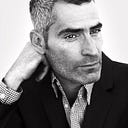Member-only story
Brokeback Mountain: 10 Years On
An Oral History
“The shirt seemed heavy until he saw there was another shirt inside it, the sleeves carefully worked down inside Jack’s sleeves. It was his own plaid shirt, lost, he’d thought, long ago in some damn laundry, his dirty shirt, the pocket ripped, buttons missing, stolen by Jack and hidden here inside Jack’s own shirt, the pair like two skins, one inside the other, two in one.” — Annie Proulx, Brokeback Mountain
The quiet, revolutionary charge of Ang Lee’s Brokeback Mountain, 10 years old this year, could be felt not only in the way it was embraced by cinemagoers, but in the way some attempted to neutralize its depiction of same-sex love by turning its most intimate and harrowing scene — Jack Twist’s “I wish I knew how to quit you” moment — into a joke. According to Jake Gyllenhaal, who played the charismatic Twist, that was something Heath Ledger, in particular, was acutely sensitive to. “He was extraordinarily serious about the political issues surrounding the movie when it came out,” he says. “A lot of times people would want to have fun and joke about it, and he was vehement about being serious, to the point where he didn’t really want to hear about anything that was being made fun of.”
Watched again a decade later, that “quit you” encounter on Brokeback Mountain — a culmination of the lovers’ lost years, symbolized in a…
